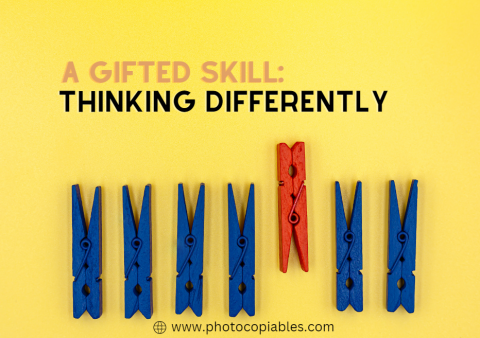Gifted students have a fantastic skill which makes them different from all people: They think differently. This exceptional skill is both a blessing and a burden for some. On the one hand, it can help them find innovative ideas and be creative in the field they work in. On the other hand, this skill can make it difficult for them to be understood by people. We may exhibit a certain prejudice towards new ideas. Sometimes, it's difficult to step away from one's comfort zone. Additionally, this negative approach can lead to extreme situations where they feel alone and become isolated with their thoughts. Nikola Tesla is a great example who has experienced isolation in his life. The eccentricities of his well-known personality contributed to this isolation; however, we should note that these eccentricities are closely connected with his distinctive way of thinking.
How Gifted Students Think Different
Gifted students have a different way of approaching the world. They possess various attributes that enhance their thinking abilities. Firstly, they are curious and get the bug in a wide range of topics. As they can learn more quickly, they want to expand their knowledge deeply in their interests. Also, they can be quite perfectionists, which has many negative consequences in their lives. Besides being perfectionists, they are emotionally more intense than their peers.
There are a number of factors that contribute to the way gifted students think. These factors include:

- Neurological differences: Gifted students often have different brain structures and functions than their peers. This can lead to differences in the way they process information, learn, and think.
- Genetics: Giftedness is thought to be at least partially genetic. This means that gifted students are more likely to have gifted parents.
- Environment: The environment in which a child is raised can also play a role in their giftedness. Children raised in stimulating and supportive environments are more likely to develop their giftedness.
It is important to note that giftedness is a complex phenomenon. There is no single explanation for how gifted students think differently. However, the factors listed above can all play a role in shaping the way gifted students think.
Here are some specific examples of how gifted students think differently:
- Gifted students possess abstract thinking skills, enabling them to engage with concepts and ideas that do not rely on physical manifestations. They can delve into the notion of justice, for instance, without relying on real-world illustrations.
- Gifted students excel at recognizing patterns and establishing connections. They can discern the intricate relationships between seemingly disparate elements. Consider their ability to comprehend how the various components of a machine interact harmoniously to facilitate its operation.
- Gifted students exhibit a heightened propensity for creativity. They possess the capacity to generate novel and innovative ideas. A prime example would be their ability to devise unconventional solutions to problems.
We have to underline their abstract and divergent thinking abilities, which makes them super thinkers and problem solvers. Besides the originality and innovation in their thoughts and their ability to make interdisciplinary connections, abstract and divergent thinking make them stand out. Now, let’s dive into these exceptional abilities.
Abstract Thinking
Abstract thinking refers to the ability to understand and work with ideas and concepts that are not necessarily tied to concrete, tangible objects or specific instances. It involves reasoning beyond what is directly observable and making connections at a higher level of abstraction. Here are some key aspects of abstract thinking:
1. Conceptualization: Gifted individuals excel in conceptualizing ideas. They can grasp the underlying principles, patterns, and structures that govern a given subject or domain. They go beyond surface-level understanding and delve into the core concepts, enabling them to see the big picture and make connections between seemingly unrelated pieces of information.
2. Symbolic Representation: Abstract thinking often involves using symbols, such as mathematical symbols, diagrams, or metaphors, to represent and manipulate ideas. Gifted individuals have a natural ability to work with symbolic representations, allowing them to engage in advanced mathematical reasoning, analyze complex systems, and express their thoughts in creative and metaphorical ways.
3. Hypothetical Reasoning: Gifted students are adept at hypothetical reasoning, which involves considering and exploring possibilities that may not exist in reality. They can generate and evaluate hypothetical scenarios, which allows them to anticipate outcomes, analyze potential consequences, and engage in "what if" thinking. This type of thinking is valuable in problem-solving, decision-making, and predicting future events.
Divergent Thinking
Divergent thinking refers to the ability to generate a wide range of ideas, solutions, or responses to a given problem or stimulus. It involves thinking outside the box, exploring multiple perspectives, and producing a variety of novel and original ideas. Here are some characteristics of divergent thinking:

1. Fluency: Gifted individuals exhibit high levels of fluency, which means they can generate a large number of ideas or solutions within a short period. They have a rich mental repository of possibilities, allowing them to quickly produce numerous alternatives.
2. Flexibility: Divergent thinking involves cognitive flexibility, which is the capacity to shift perspectives, switch between different modes of thinking, and consider multiple viewpoints. Gifted students can easily adapt their thinking, break away from conventional ideas, and explore diverse approaches to problem-solving.
3. Originality: Gifted individuals often demonstrate originality in their thinking. They can come up with unique and unconventional ideas that depart from the mainstream or expected solutions. Their ability to think creatively and make novel connections allows them to introduce fresh perspectives and innovative solutions to problems.
4. Elaboration: Divergent thinkers excel in elaborating on their ideas. They can expand on initial concepts, add details, and refine their thinking. They have the ability to dig deeper into a particular idea or explore its implications, contributing to the development of more complex and sophisticated solutions.
Both abstract thinking and divergent thinking are crucial cognitive abilities that enable gifted students to approach problems, concepts, and ideas in unique and insightful ways. These thinking skills help them break free from conventional patterns, explore new possibilities, and contribute to innovative solutions and creative endeavours. Nurturing and supporting these thinking abilities can empower gifted individuals to reach their full intellectual potential and make significant contributions in their fields of interest.
The Shadows of Thinking Differently
Thinking differently can have both positive and negative consequences. On the one hand, it can lead to creativity, innovation, and new ideas. On the other hand, it can also lead to isolation, misunderstanding, and prejudice. In educational settings, thinking differently finds its well-deserved place, but beyond school walls, it can be a daunting journey for those who think differently.

Individuals who think differently are often perceived as odd or eccentric. They may be labelled as “weird” or “different.” This can make it difficult for them to conform to mainstream expectations. They may also be misunderstood by others, who may not be able to see the value in their unique perspective.
However, people who think differently can also be incredibly creative and innovative. They are often able to see the world in new and different ways, which can lead to new ideas and solutions to problems. They may also be more likely to take risks and try new things.
Ultimately, the consequences of thinking differently depend on the individual and their environment. If a person is able to find a supportive environment where their unique perspective is valued, they can thrive. However, they may struggle if they are surrounded by people who do not understand or appreciate their way of thinking.
Thinking differently can be a challenge, but it can also be a gift. If you are able to embrace your students' unique perspectives, they can achieve great things. However, there’s a hidden danger waiting at the back of the door: Perfectionism. This is the topic of our next blog post.
How to develop Thinking differently in class
To foster and support the thinking differently abilities of gifted students, it is essential to provide them with an enriching and nurturing environment that encourages and cultivates their unique cognitive strengths. Here are some strategies that can help:
1. Differentiated Instruction: Tailor instruction to meet the specific needs and abilities of gifted students. Provide them with opportunities for independent study, advanced coursework, or accelerated learning that challenges and stimulates their thinking. Offer differentiated assignments and projects that allow for open-ended exploration and encourage creative problem-solving.
2. Encourage Intellectual Curiosity: Foster a culture of intellectual curiosity and encourage gifted students to explore their interests and pursue their passions. Provide access to a wide range of resources, such as books, research materials, online databases, and mentors who can support and guide their learning journey.
3. Offer Diverse Learning Experiences: Provide varied and diverse learning experiences that engage different modes of thinking. Incorporate hands-on experiments, real-world applications, collaborative projects, debates, and discussions to promote critical thinking, abstract reasoning, and creative problem-solving.
4. Support Metacognition: Help gifted students develop metacognitive skills, which involve thinking about their thinking processes. Encourage them to reflect on their own thoughts, strategies, and problem-solving approaches. Teach them to analyze their strengths and areas for improvement, set goals, and monitor their progress. This self-awareness and self-regulation enhance their ability to think differently and adapt their thinking strategies as needed.
5. Cultivate a Supportive Peer Network: Create opportunities for gifted students to interact and collaborate with like-minded peers. Encourage group projects, discussions, and extracurricular activities that foster intellectual engagement and provide a sense of community. This peer network can serve as a support system where gifted students can share their ideas, exchange perspectives, and feel understood.
6. Embrace Mistakes and Risk-Taking: Encourage a growth mindset and create a safe environment where gifted students feel comfortable taking intellectual risks and making mistakes. Help them understand that failure is an inherent part of the learning process and an opportunity for growth. Encourage them to embrace challenges, think outside the box, and explore unconventional ideas without fear of judgment or criticism.
7. Provide Mentoring and Expert Guidance: Connect gifted students with mentors, experts, or professionals in their fields of interest. Mentors can offer guidance, share their own experiences, challenge their thinking, and provide valuable feedback. This mentorship can help gifted students expand their horizons, refine their ideas, and gain insights into their areas of passion.
8. Offer Enrichment Opportunities: Seek out and provide enrichment opportunities beyond the regular curriculum. This can include participation in competitions, academic clubs, research programs, internships, or specialized courses that cater to their interests and allow them to explore advanced topics in their fields of interest.
Remember that every gifted student is unique, so it is important to tailor interventions and support based on individual strengths, interests, and learning styles. By creating an environment that nurtures and supports their thinking differently abilities, we can empower gifted students to fully develop their potential and make meaningful contributions to their chosen fields.
Below, you’ll find a lesson plan to foster thinking differently in your classroom. You can download it and embrace and practice thinking differently in your classes.
This blog post is co-created with an LLM chatbot.
| Attachment | Size |
|---|---|
| 695.08 KB |






